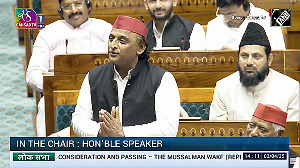Breast cancer cases among men may be less than in women, but it is definitely causing concern with doctors blaming it on the sheer lack of awareness.
Genetic disorder, obesity, alcohol intake, prior exposure to radiation, family history, are some of the factors that has led to the spread of this rare disease.
According to the Delhi Cancer Registry, more than 3 per cent of breast cancer deaths in 2001 were reported among men, which is more than the deaths occurred due to small intestinal cancer and thyroid.
Every year about 75,000 new cases of breast cancer are reported in India, out of which a small but increasing number is from men, said Sidharth Sahni, consultant in the Surgical Oncology Department at Artemis Health Institute in Gurgaon.
"Cases of breast cancer in men is a reality and cannot be ignored. For many, breast cancer among men may sound bizarre as they compare it with women's breast cancer," he said.
Men have all the same types of tissue in their breasts as women. "But they have fewer ducts and globules and these are not as developed as those in women. This is why the cases are less reported among men," he added.
According to Dr P K Julka, professor of Oncology at AIIMS, Asian men are less susceptible to breast cancer, as compared to African-American or Caucasian.
He said that 1 per cent of his patients were men in the past two years. "There is no need for panic. The cases have not risen dramatically. There is just a slight rise. But men should know they could be at risk and shouldn't think that it is just a women's disease," Julka told PTI.
Julka said unmarried men could also be affected with the disease.
Infertile men or those whose liver has been damaged by liquor or due to other reasons, possibly through hormonal imbalances, could be affected with the problem, he said.
The oncologist said the Klinefelter's syndrome or chromosomal abnormality increases the risk of developing breast cancer by 50 per cent in men.
He said those who have genetic disorders should be careful as they could also be at high risk.
"They should take it seriously when they see a painless lump or when they find bleeding from their nipple or discharge," he added.
Surgery is usually the common treatment followed by radiotherapy and chemotherapy and hormonal therapy.
"It is not right to say that this is confined to urban areas only. We have seen an equal number of patients from rural areas too," Julka said.
Among men the cases are reported at the age of 60, while symptoms among women are seen at a younger age.
Doctors said hormonal imbalances and altered testicular function have been found to be the reason for all breast cancer deaths.
Gauri Kapoor, senior consultant in the Department of Surgical Oncology at Rajiv Gandhi Cancer Institute, said though it is a rare disease, they have seen many cases in the past few years.
"Most men are not even aware that they could also be affected with breast cancer and as they are not able to recognise the symptoms, they generally come for treatment at a very late stage when the cancer reaches their chest wall," she said.






 © 2025
© 2025